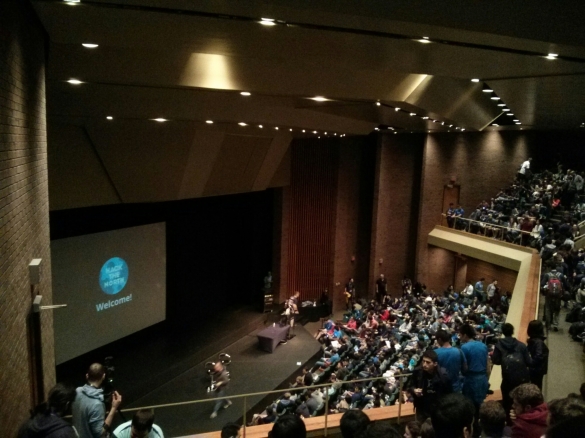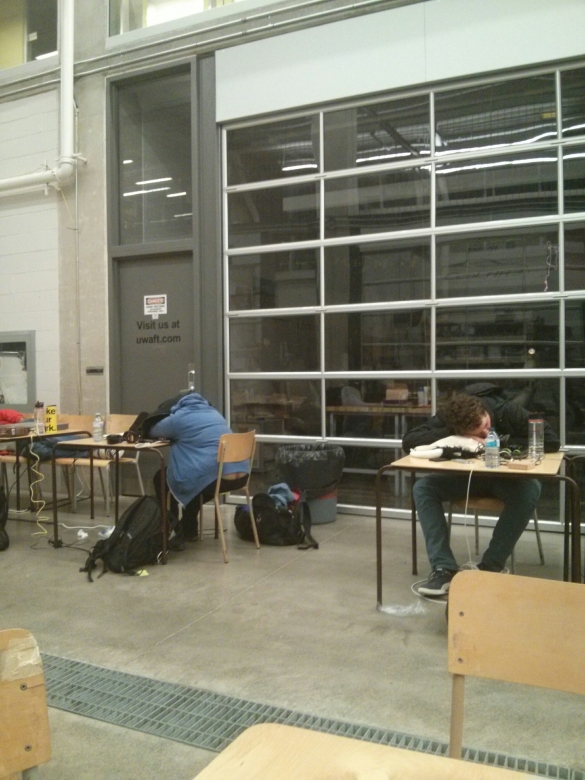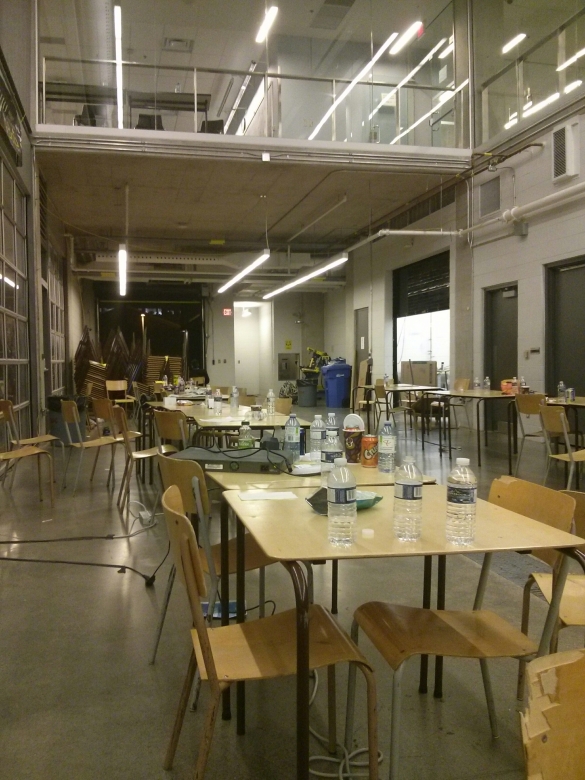To keep up with the hackathon-ing theme, I spent the weekend before last at another hackathon – Money 20/20 – but this one was a little different since it was open to professionals and students. Oh, and it was in Las Vegas! Talk about a great location! Money 20/20 is the biggest tech finance conference in the world(?), bringing in delegates and speakers to talk about the latest trends in the industry from Bitcoin to Apple Pay. This year they ran a hackathon the weekend before the conference and booked a fantastic space for hackers to attend at minimal cost – $10 – at the Aria hotel. Being a finance based hackathon, and in Vegas on top of that, meant that there were some crazy cash prizes up for grabs. USD 20k prizes for the top 5 teams, 5k prizes for another 5 teams after that and sponsor API prizes as well e.g. 15 Bitcoin!
The company I’m interning for, Axiom Zen, sent out an email a few weeks before the hackathon to ask if anyone was interested in attending and pretty quickly, we had a group of 10 hackers representing – one team of 5 (the max size) developing a time tracking and invoicing app for contractors (Hour Flow), a team of three developing an all-in rapid trading Bitcoin mobile app (BitBuyBit) , and a team of two (which I was in) developing an API for game developers to integrate Bitcoin powered competitions (Propane).
Axiom Zen took care of booking our flight tickets and accommodation for the night before the hackathon, and so all we had to do was plan and come up with ideas that used the sponsor APIs (a rule of the hackathon). I’d like to think the ideas above sound pretty interesting, and it definitely took some coming up with them – for the team I was in at least. My partner is one of the front-end engineers I work a lot with at Axiom Zen, which worked out well since my skills have (until recently) been focused on the back-end and with only two people and a 24 hour hackathon, there isn’t too much time to pick up new technologies!
Neither of us were super familiar with Bitcoin – which two of the sponsor APIs were based on – and the other sponsor APIs ,which were payment based, didn’t particularly inspire us since they seemed to emphasize design rather than any novel tech. But hey, Bitcoin is the topic of the moment so after at trip to a Bitcoin ATM in downtown Vancouver (Bitcoin is surprisingly hard to buy), we were good to go with our Bitcoin powered API for game competitions idea.
First Impressions and Tech
We turned up the night before the hackathon and spent it off the strip at a huge house that one of the founders at Axiom Zen found for us, but since it was Friday and Halloween, getting a cab back to the Strip was a little harder than we though – hour and a half wait, anyone? – and so we spent the night in and got some pizza.

And this was just the airport…
The morning of the hackathon, we all headed off to the Aria hotel and well, if you’ve never been to Vegas, it is some place. Everything is done on an excessive scale. Paris has the Eiffel Tower, well so does Vegas. Egypt has a pyramid, well so does Vegas. You get the idea. The hackathon was held in one of the conference rooms in the Aria and it was pretty epic. It was the best organized and well catered event that I’ve ever been to. Meals were buffet style and there was a range of sodas that was restocked throughout the day and night.

Who needs to travel to see the sights when you can go to Vegas
My team ended up building our app in Rails for the backend and Angular running on Node for the front-end. We had different backends since that let us keep things pretty self-contained which enabled us to work independently of each other. I used Rails for the same reason I’ve always done, it’s fast to prototype things and it’s the backend language I know best. Would another tool like Node have been more suitable – yes, and I’ve made a pact that I’m using Node for the next hackathon I go to (as I write this, I’ve now picked up enough Node skills to get by with at a hackathon). Saying that, after using Rails for the last couple of hackathons I’ve been to, building up the API for our product wasn’t too challenging. The hardest part was having the sponsor API we were using go down in the last few hours before submission and making changes to the database schema while sleep deprived.
Never mind, it was all over pretty quickly. Work had been really busy in the week leading up to the hackathon and so this was definitely the hackathon I was most tired at – I was sleep drunk by 1am. I’m still not sure if I’m glad that the clocks went back with the end of daylight saving – on one hand we got an extra hour of hacking, and on the other, well, we got another hour of hacking. It probably worked out for the best since the sponsor’s API went down towards the end and we were getting 500 errors up until the last 30 seconds before hacking finished – couldn’t figure out if it was the sponsor’s API or us for a long time. Anyway, onto the judging.
Judging
Judging happened in two phases. In the first phase, teams pitched to a rep – normally a CEO/CTO or some other senior officer – of the API sponsor. Two to three teams were then selected from the 9 sponsors to move onto the next round where they would have 2 minutes to pitch their product on stage to a panel of judges composed of the judges in the first phase.

Getting ready for the judging
Two of the teams from Axiom Zen team made it through to the next round – the team working on the time management/invoicing app and also the team I was on. The team building the quick buy/sell Bitcoin were really unlucky not to have made it through. The fact that they were literally the last team out of 100+ teams to pitch in the first round made it hard to make an impression when all the judges wanted to do was move onto the next phase (we were behind schedule as always seems to happen at hackathons) and also, their idea was stunningly and beautiful simple – which I think judges may have held against them. If that didn’t quite make sense, let me put it this way – although it’s not quite the same (since the Bitcoin buying/selling app was much more complex and valuable), an app like Yo would never win a hackathon and yet, everyone in the tech industry knows it!
The team that made the time management app were one of the first few finalists up on stage to pitch and they were great. It was an amazing pitch. It helped a lot that one of them was the guy who I won Hack the North with a month or two ago – he pitched then too! They definitely benefited from having finished working on their app early during the hackathon – an hour or two before the end – and were able to practice their pitch beforehand. In contrast, I ended up pitching our app on stage while trying to figure out what to say just in the moments leading up to it – and… well, I ended up fumbling on stage. It was pretty painful.
I had the first few sentences of my pitch memorized but once I deviated from those, well, I just got lost. Think long awkward pauses and the camera guy hissing at me. I guess when you memorize something, you don’t really have a train of thought and that makes it really hard to adapt to changes or a missed line/word.
The aftermath
It took me more than a week to finish this post because I was pretty disappointed at costing my team a prize – we didn’t place and I feel pretty confident in saying that our hack was better than some which did. But I guess that’s life. You live and learn. It was pretty cool though that the other finalist team from Axiom Zen picked up a 20k prize!
After lots of thinking this past week, the three points I’m taking away from this hackathon are:
1) Fatigue is debilitating and it can be hard for you to realize that in the moment
2) Don’t try to memorize a speech since you’re at risk of not following your own train of thought and you’ll be unable to adapt with even the slightest change in environment/presentation
3) When it comes to competitions and maybe investments, a good pitch is better than a good app. You need to communicate what you’ve done or even what you will do (some hackathon can be bits of cardboard stuck together but if you can sell that…)
Above all, is to keep on trying. What is it they say about falling down 8 times and getting up 9.
I spent a little while after the hackathon recovering and feeling sorry for myself (and for my partner too for messing things up!) but by Monday night, I figured the best way to deal with it was to get back on the horse again , and so I started learning Node. And a few days later, registered to participate at Startup Weekend Vancouver – a weekend where the idea is to create an MVP and startup in just a few days. That’s this weekend and I figure it’ll give me a chance to apply what I’ve learned about Node and maybe about delivering a good pitch as well.
So yeah, keeping busy and moving forward is probably my way of dealing with my slip up at Money 20/20. At the end of the day, my team did well to make it to the finals, and it was definitely good experience getting the chance to pitch in front of lots of people – better to lose $20k than $200k, or maybe even $2m(?). You never know where this crazy tech stuff will lead. And just like Vegas, I think that’s what keeps it exciting.








